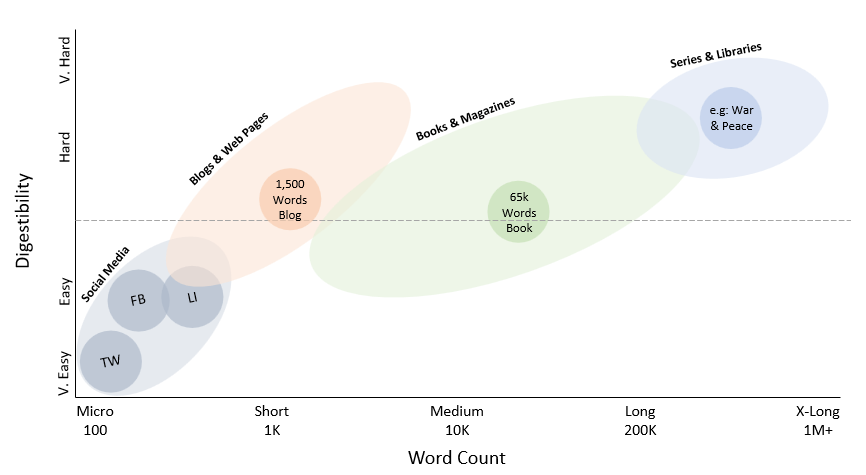Home » Blog » Online Books » Supressed Creativity
Supressed Creativity

Written by
Phil Winston
Linked to the ideas outlined in the DPP Fundamental Truth, it is our firm belief that a more widely available and less technically challenging method of publishing books, would unleash an artificially suppressed level of artistic expression.
Our Reasoning
An idea currently exists that a "legitimate" book is a physical, paper based, object. That a book is paper pages and ebooks are digital versions of the paper book. But paper books are really only around, in a viable sense, for roughly 600 years. Before that there were manuscripts and scrolls, the production and access of which were limited to certain segments of society.
What will we mean by the word "book" in another 200 years? Will it still be made from paper? Given the materials used in its production, should it be? What functionality will the books of the year 2,225 possess, and is any of that possible now? Many questions here, and plenty of room for debate.
What we can say, however, is that paper books viewed over a multi-millennia long timeline starting back when Socrates declared them immoral, are a transitory format. This is meant in the same way as fossil fuel powered cars will eventually be viewed in the timeline of transport. The perspective that books are and should remain paper based is therefore a limitation on what they could be, and what they could enable as a canvas for the artists that use them.
Idea Canvas
Whatever your perspective on what an idea is, be it magical or the result of a process, the reality is that a book is not the idea it contains, as much as a map is not the terrain it portrays. An idea exists independent of the format, and limiting what qualifies as a book to certain modes and formats, only limits the expression and dissemination of the ideas within.
One positive step taken to move away from the restriction of specific reading devices is through the medium of the internet, with websites a more than adequate location for books to take residence.
But as outlined in the DPP Fundamental Truth, format and structure matter.

Online also offers the possibility to create without material limitations, and this can flow through to a reduction in production costs, sale price, and distribution.
The question is therefore "what prevents the web from taking its rightful and logical place as the domain of reading and books?". The internet is over a quarter of a century old after all, and we have clearly stagnated in the development towards the ideal solution.


Well, there are a few reasons for this, which we will now outline.
1. Intentional Design
Did you ever wonder why there aren't book or author specific website URL extensions? A ".book" or ".author" type ending that would append a website address in the same way a .com or .org would. We have ".wedding", ".fishing" and even ".pizza" if you need it, but nothing for the multi-billion $US global market of authors? If you can imagine such things existing it would immediately enable web destinations like "prideandprejudice.book", or even "janeausten.author".
It is easy from there to imagine improvements in both marketing fluency and the decentralisation of control over book distribution. What exactly could be at "janeausten.author" except a site about an author of books? "janeausten.com" on the other hand could be a business consultant, or discussion forum, or even an alternative to a LinkedIn page. But a site ending in .author is pretty definitive, as is .book.
The answer is that in 2014, Amazon purchased the .book, .author, and .read domain extensions from ICANN, and effectively warehoused them.
Yes, you read that right. These locations do exist, but they appear to have been intentionally(?) hidden away. The reasoning for this wasn't exactly broadcast, but the effect was the removal of the opportunity for websites to become books, and coincidentally the entrenchment of the Kindle marketplace. In any rational world, we could easily infer this effect from the observed cause. But we wouldn't do that... or would we! ;)

But to be more serious about this, as it deserve that at least, the first reason for the stagnated adoption of the web as a medium for books is a technical limitation, one created by a multinational corporation. A parallel coincidence exists in Apple disallowing the use of Flash on its Safari browser over "battery life concerns". The subsequent launch of the App store, where Apple takes up to 30% of revenue on anything sold there through apps that can offer the functionality that Flash once did on the open web... well, pure coincidence as we said. They done it for you own good. Battery life was that important to them.
2. Platform Limitations
It is also our observation that the market for digital books is supressed by the very market structure that is dominated by platforms like the aforementioned owners of vast swathes of internet real estate. Effectively, as much as they enable, they themselves have limitations to access the actual market, and in being bound to them, their limitations become ours.
What we mean by this is that wherever ereaders are available, and affordable, ebooks are widely read. The lack of ereader distribution is therefore a primary reason for suppressed adoption of ebooks. The digital book medium itself is not the root cause of supressed adoption, only the ability to access it.
There is also evidence that the adoption of ebooks is facilitated by the price difference between print and digital formats. When Amazon sold ebooks at $9.99 and the print version of that same book at $14.99, adoption rates were high, with the recent reduction in ebook usage coming only after prices equalised.
This was a result of price control returning to the publishing houses at the end of the contract with Amazon however, and not due the drivers of supply and demand. Trad Pub houses appear to prefer books are limited to the physical paper format, which we can only imagine is linked to a certain level of ownership or investment in physical distribution channels.
This is perhaps the most straightforward conclusion when paired with the first reason outlined earlier, in that it is not in the interest of incumbent market players to enable anything that would degrade their control over their current position of strength. It is logical, and it also isn't a far fetched idea, with the concept of the Innovators Dilemma highly regarded in business circles.
3. A Fragmented Marketplace
The global book market is large, but as covered in this DPP blog on the global ebook market, it is not a monolith. It is fragmented across language, continental, and corporate dimensions.
This makes it difficult for device specific formats to achieve ubiquitous adoption across any greater areas than that covered by the footprint of the firm that owns it. This in turn slows the adoption of digital in its march towards being the dominant book medium. The old restrictions on creativity remain in place, and the stagnation continues.
These device, platform, and market barriers combine to restrict access for authors to sell and readers to consume books and ideas. Their erosion requires a device agnostic format distributed direct to reader on channels they can access and pay through. And this is precisely the reason why the DPP was created.
Conclusion
Publishing through the DPP means your book will be available through the most widespread and easily accessible distribution channel on the planet. The Internet.
Your book published in a medium accessible to anyone with access to Chrome, Safari, Firefox, Edge, Brave, Opera, Vivaldi, Mosaic, or any modern web browser.